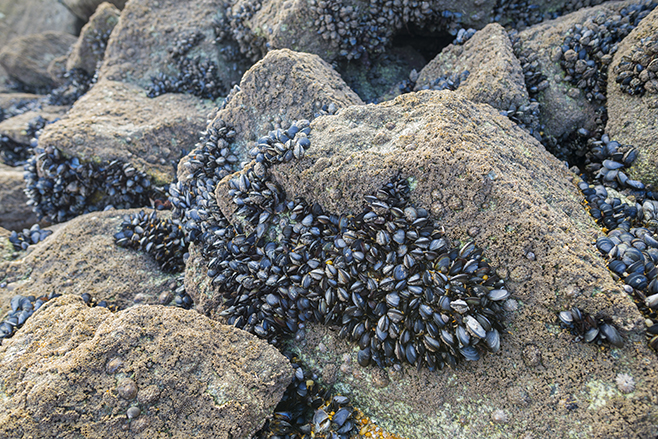Recognizing the dramatic effect that climate change is going to have (and is already having) on the planet is different than actually doing something about it. On November 30th, more than 140 world leaders converged for the Paris climate talks, hoping to come to some agreements on how to address it. The conference represents the 21st session of the Conference of the Parties (COP21), the decision-making body of the United Nations Framework Convention on Climate Change (UNFCC). Their purpose here is to review existing environmental policies and to suggest new ones, including, many scientists and citizens hope, the first global agreement on emissions reductions. But there’s one glaring admission from the agenda: the effect of climate change on the ocean.
Rising Sea Temperatures
The ocean is the world’s largest ecosystem — representing more than 70 percent of the Earth’s surface. As such, the world’s oceans are arguably most at risk from climate change. Greenhouse gas emissions have risen exponentially since the Industrial Revolution, causing temperatures to rise both on land and at sea. Scientists estimate that the oceans have absorbed approximately 93 percent of all additional heat energy generated by the greenhouse effect so far.
Again, as many divers have witnessed firsthand, coral bleaching is one of the most serious and obvious effects of rising sea temperatures. As the water around tropical reefs exceeds normal temperature, corals become stressed and expel the symbiotic zooxanthellae that live within their tissues. These algae-like organisms give the reef its color, and generate food for their coral hosts via photosynthesis. Without them, the reef becomes pale and sickly-looking, its corals unable to generate the energy needed to thrive. If water temperatures stay high, the coral dies. Rising water temperatures are not the only cause of coral bleaching, but are nevertheless a significant trigger for a phenomenon that has already claimed 40 percent of the world’s coral reefs.
Although the remaining reefs account for just 0.1 percent of the global ocean area, they support approximately 1/4 of all marine life. As more and more reefs are lost, so the breeding and feeding grounds of countless fish species disappear, a catastrophic eventuality with ramifications for the entire food chain. Unfortunately, coral bleaching is not the only disaster heralded by rising sea temperatures. As polar icecaps melt at faster-than-average rates, so to do sea levels rise and ocean salinity decreases. Marine animals are being forced to move outside of their natural territory in search of cooler waters, upsetting the predator-prey balance and leading to the appearance of potentially devastating invasive species.
Ocean Acidification
Another equally worrying effect of climate change is ocean acidification. Fossil fuels are responsible for the release of billions of tons of carbon dioxide into the atmosphere so that today, carbon dioxide levels are the highest they have been for more than 15 million years. The ocean is a natural carbon sink, absorbing approximately half of all anthropogenic carbon dioxide emissions, a figure that equates to around 525 billion tons in the last 200 years. In 2015, it was estimated that 22 million tons of carbon dioxide are absorbed into the world’s oceans every day, which has led to a 25 percent increase in ocean acidity in the past two centuries.
The effects of an increasingly acidic ocean area as yet little understood, although scientists think that corals and shelled organisms are particularly at risk. For corals, a drop in pH causes the corrosion of existing coral skeletons, while the carbon ions the corals need to build new skeletons are made less abundant by the process of acidification. The result is weaker reefs that are less able to regenerate, and therefore more vulnerable to external stressors including storm erosion, bleaching and disease. Animals that build their shells from calcium carbonate are similarly affected. By the end of this century, mussels are expected to suffer a 25 percent decrease in their ability to grow new shell, while oysters are expected to suffer a 10 percent decrease.

Human Consequences
That the Paris climate talks are not addressing the effect of climate change on the ocean seems wildly short-sighted when one considers the just consequences for humanity. Rising sea temperatures and ocean acidification together have the potential to trigger a devastating loss of marine biodiversity, which in turn will directly affect the success of commercial fisheries and aquaculture, damaging local and national economies and threatening the food security of coastal communities in particular. In terms of tourism, those areas that rely on healthy reefs to attract divers, snorkelers and fishermen will also suffer from a devastating loss of income.
Just as worrisome, rising sea levels threaten the very existence of low-lying coastal areas and island-states, while changing ocean temperatures will inevitably affect global weather, including rainfall, as well as the duration and ferocity of the annual hurricane and typhoon seasons. With so much at stake, governments must acknowledge that terrestrial and atmospheric climate change is inextricably linked to the changes occurring at sea. The Paris climate talks have the power to implement legislative change on a global scale. Jacqueline Gill, paleoecologist at the University of Maine, summed the situation up succinctly, saying “there is such a thing as a point of no return in the environment. My concern is, by the time we get the governments and citizens on board, it will be too late.”
Although the Paris climate talks are already underway, an alliance of NGOs and research institutes known as The Ocean and Climate Platform are petitioning to have ocean issues added to the agenda. To add your name to their petition, click here.

